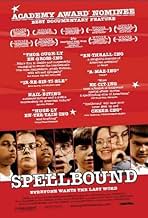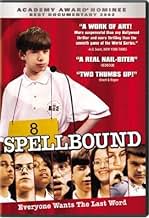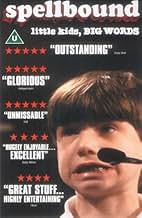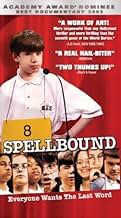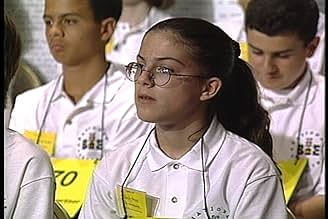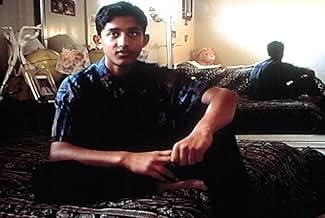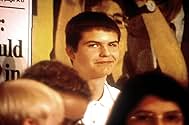VALUTAZIONE IMDb
7,6/10
12.580
LA TUA VALUTAZIONE
Aggiungi una trama nella tua linguaFollows eight teenagers on their quest to win the 1999 National Spelling Bee.Follows eight teenagers on their quest to win the 1999 National Spelling Bee.Follows eight teenagers on their quest to win the 1999 National Spelling Bee.
- Candidato a 1 Oscar
- 17 vittorie e 19 candidature totali
Ubaldo Arenivar
- Self - Angela's Father
- (as Ubaldo)
Jorge Arenivar
- Self - Angela's Brother
- (as Jorge)
Scott McGarraugh
- Self - Ranch Owner
- (as Mr. McGarraugh)
Lindy McGarraugh
- Self - Ranch Owner
- (as Mrs. McGarraugh)
Concepción Arenivar
- Self - Angela's Mother
- (as Concepción)
Neelima Marupudi
- Self - Potter County Champion
- (as Neelima)
Parag Lala
- Self - Nupur's Father
- (as Parag)
Meena Lala
- Self - Nupur's Mother
- (as Meena)
Kuna Lala
- Self - Nupur's Brother
- (as Kuna)
Tim Brigham
- Self - Ted's Brother
- (as Tim)
Earl Brigham
- Self - Ted's Father
- (as Earl)
Recensioni in evidenza
A fascinating look at spelling bees that manages to be entertaining and exciting at the same time. You really feel sorry for the poor kids who have to try and spell out words that you've never heard of, while their parents urge them on.
The kids themselves are an interesting mix as well. Every single one looks like every nerd cliché ever put on film, and the children portrayed in the film seem very stereotypical. Obviously, this is a choice made by the makers of the film, but I hope they haven't made them more stereotypical than they really are. Because in the end, what makes this film good is the chance to hear from people that otherwise would never get to tell their stories. [8/10]
The kids themselves are an interesting mix as well. Every single one looks like every nerd cliché ever put on film, and the children portrayed in the film seem very stereotypical. Obviously, this is a choice made by the makers of the film, but I hope they haven't made them more stereotypical than they really are. Because in the end, what makes this film good is the chance to hear from people that otherwise would never get to tell their stories. [8/10]
Spellbound is a surprisingly moving film, because it is not really about spelling, but about hopes and dreams. There's a lot of love in the film, and it's interesting how different families have different approaches... all the way from hands-off parents to parents hiring drill coaches. The film does a good job of showing the backgrounds of the kids and presenting their personalities. I found myself trying to spell right along with them (unsuccessfully).
Spelling bees promote the worst kind of rote learning, especially when the kids are faced with words they will never use in real life. That's thousands of hours either totally wasted or to be less critical, hours that could have been put to better use, for example, learning creative writing or public speaking. Even so, as one parent says, this is practice to form a habit of perseverance for the future.
The pacing and music were perfect, the way the challenge was presented was clear and straightforward. Excellent film.
Who should see this film:
-- Kids of all ages
-- Everyone else. It's not at all boring.
I'll give Spellbound a perfect 10 out of 10.
Spelling bees promote the worst kind of rote learning, especially when the kids are faced with words they will never use in real life. That's thousands of hours either totally wasted or to be less critical, hours that could have been put to better use, for example, learning creative writing or public speaking. Even so, as one parent says, this is practice to form a habit of perseverance for the future.
The pacing and music were perfect, the way the challenge was presented was clear and straightforward. Excellent film.
Who should see this film:
-- Kids of all ages
-- Everyone else. It's not at all boring.
I'll give Spellbound a perfect 10 out of 10.
"Spellbound" is one of those documentaries that isn't soaked with politics or social dilemmas, but it is touches on them indirectly. It's the story of 8 kids from all over the United States, their study habits, lives, relationships with parents and personal beliefs, views and opinions. And how they make it to the National Spelling Bee Contest.
These stories are all incredibly touching - my favorite is about one of the girls' grandfathers who illegally crossed the border into the U.S., got held at a detention center, then, finally accepted into the US, worked really hard and finally now, in his old age is able to say that he is happy. That he saw his kids get great education and good opportunities; essentially that all his hard work didn't go to waste.
The film is also tense - it communicates the tension inherent in any contest quite effectively here. By acquainting the viewer with the children before the contest an empathy is established and you find yourself rooting for them. You may not even realize it until, towards the end of the film, the filmmakers throw in a brief interview with a young, Jesus-freak kid and I didn't care which one of the eight kids featured in the documentary won as long as he didn't. I got what some would call "passionate" about the outcome of the contest.
Needless to say, it's a great story. It explores the tensions of fitting in at school, parental pressure, competitiveness and hobby/interest becoming an obsession. Some have said that it is a film about America, but I wouldn't venture as far. The film says far too little about the origins and history behind the Spelling Bee contest to be about an "American phenomenon," much less about a "phenomenon" of any kind. It's a film about one Spelling Bee, but even more so about eight kids who compete in it. And their parents and siblings and teachers. It's easy as hell to get a rush of memories from childhood watching this film, and it's oftentimes easy to cringe at the intensity of the entire affair. But, all in all, "Spellbound" is a great documentary which doesn't belittle its subject, but gives it its fullest attention - the product is a tense, funny and dramatic film about kids bonding over a common obsession, while aggressively competing. Logorrhea.
These stories are all incredibly touching - my favorite is about one of the girls' grandfathers who illegally crossed the border into the U.S., got held at a detention center, then, finally accepted into the US, worked really hard and finally now, in his old age is able to say that he is happy. That he saw his kids get great education and good opportunities; essentially that all his hard work didn't go to waste.
The film is also tense - it communicates the tension inherent in any contest quite effectively here. By acquainting the viewer with the children before the contest an empathy is established and you find yourself rooting for them. You may not even realize it until, towards the end of the film, the filmmakers throw in a brief interview with a young, Jesus-freak kid and I didn't care which one of the eight kids featured in the documentary won as long as he didn't. I got what some would call "passionate" about the outcome of the contest.
Needless to say, it's a great story. It explores the tensions of fitting in at school, parental pressure, competitiveness and hobby/interest becoming an obsession. Some have said that it is a film about America, but I wouldn't venture as far. The film says far too little about the origins and history behind the Spelling Bee contest to be about an "American phenomenon," much less about a "phenomenon" of any kind. It's a film about one Spelling Bee, but even more so about eight kids who compete in it. And their parents and siblings and teachers. It's easy as hell to get a rush of memories from childhood watching this film, and it's oftentimes easy to cringe at the intensity of the entire affair. But, all in all, "Spellbound" is a great documentary which doesn't belittle its subject, but gives it its fullest attention - the product is a tense, funny and dramatic film about kids bonding over a common obsession, while aggressively competing. Logorrhea.
In one sense, the U.S. National Spelling Bee is a strange thing, a freakish competition for freaks to take part in, and designed to make them only more freakish. You don't have to understand the words to win, you merely have to spell them, and the winner would seem to have proved little else than their willingness to work hard for no social benefit, and their ability to withstand extreme pressure. Make no mistake, the kids featured in this documentary are bright and talented, but one can't help but wonder whether such ruthless competition, or the attitude that they are in some sense a "gifted" elite, is really good for society or for the individuals themselves.
But it's not the competition that makes 'Spellbound', a documentary about 1999's contest, so gripping (we follow eight of the 249 finalists, but the film is sympathetic to them all, and does not encourage us to set one against the rest). Rather, this comes from the way the 'Spellbound' reminds us what a diverse country America is: ethnically, socially, physically. These kids come from all over, and while on one hand we see a very unusual slice of American life in this film, it's nonetheless a surprisingly broad one. Some of the contrasts are obvious: a family of Indian descent say that in America, if you work hard, you will succeed; but we also meet a family of Mexican descent (who consider that they have worked hard and succeeded, but who have little compared with the Indians), and a black family in a grim district of Washington (arguably failing to thrive after several hundred years). Yet in spite of their differences, their children are all (give or take the final few words) as good as each other (at least when it comes to spelling). Today, social mobility in America is lower than in Europe; but the old American dream, it seems, lives on in the spelling bee. And although the extreme preparation of most competitors appears to place a ludicrously inflated value on the work ethic, and though some (though not all) of the parents are frighteningly pushy, there's also something quite sweet, in this age of guns and violence, in such a fierce competition fought only with words.
'Spellbound' is filmed without tricks, or any special artiness, but nonetheless offers an unexpected insight into contemporary American society. But please let us not copy them and bring the bee back here!
But it's not the competition that makes 'Spellbound', a documentary about 1999's contest, so gripping (we follow eight of the 249 finalists, but the film is sympathetic to them all, and does not encourage us to set one against the rest). Rather, this comes from the way the 'Spellbound' reminds us what a diverse country America is: ethnically, socially, physically. These kids come from all over, and while on one hand we see a very unusual slice of American life in this film, it's nonetheless a surprisingly broad one. Some of the contrasts are obvious: a family of Indian descent say that in America, if you work hard, you will succeed; but we also meet a family of Mexican descent (who consider that they have worked hard and succeeded, but who have little compared with the Indians), and a black family in a grim district of Washington (arguably failing to thrive after several hundred years). Yet in spite of their differences, their children are all (give or take the final few words) as good as each other (at least when it comes to spelling). Today, social mobility in America is lower than in Europe; but the old American dream, it seems, lives on in the spelling bee. And although the extreme preparation of most competitors appears to place a ludicrously inflated value on the work ethic, and though some (though not all) of the parents are frighteningly pushy, there's also something quite sweet, in this age of guns and violence, in such a fierce competition fought only with words.
'Spellbound' is filmed without tricks, or any special artiness, but nonetheless offers an unexpected insight into contemporary American society. But please let us not copy them and bring the bee back here!
When one says that they are excited to see a documentary on the 8th graders' National Spelling Bee, that person is met with a look and an `Oooookaaaay
.' I was on the receiving end of these looks for the last two years when I wanted to see `Spellbound', Jeffrey Blitz's 2002 documentary about the `spelling elite'. I finally got my wish recently and was thrilled that it met (and exceeded) my high expectations for the film.
For `Spellbound', Blitz traveled around the United States and chose eight competitors, aged 11-14, to profile before the eventual climax of the actual spelling bee. We see the home lives of the eight students, who range from poverty to upper middle class affluence, single parent families, and two-parent homes. There are even Archie and Edith Bunker reincarnated as the parents of one girl, and another girl whose parents, though having lived in the United States for over twenty years, don't speak English. Though these students come from fairly different backgrounds, they seem to be treated slightly different because of their intelligence, and therefore descend upon Washington D.C. for the Spelling Bee with a commonality.
`Spellbound' is Jeffrey Blitz's first film and he already exhibits a masterful eye for the documentary genre. Though the profiles are fairly routine, the second half of the film, the Spelling Bee itself, is so compelling that I felt the same effect as your average suspense film. The viewer is naturally led to pick a `favorite', though not guided to any specific child. My `favorite' was knocked out fairly early and I truly felt something. There is nothing fancy about the camera work, there are no stark white backgrounds or a Phillip Glass score, or a reactionary topic. What I felt while watching this film was that I was sitting among the audience and letting the camera be my guide one of the most important elements of a good documentary film.
Whether you think the subject matter isn't worthy of an hour and a half treatment, or didn't notice it in the year of `Bowling for Columbine' (which beat `Spellbound' to win the Best Documentary Oscar for 2003) I would recommend picking up this film. It's heart breaking at times, but mostly, inspirational because some of these kids have more maturity in one arm than a lot of adults I know, and their grace under pressure is both awe-inspiring and something to aspire to.
--Shelly
For `Spellbound', Blitz traveled around the United States and chose eight competitors, aged 11-14, to profile before the eventual climax of the actual spelling bee. We see the home lives of the eight students, who range from poverty to upper middle class affluence, single parent families, and two-parent homes. There are even Archie and Edith Bunker reincarnated as the parents of one girl, and another girl whose parents, though having lived in the United States for over twenty years, don't speak English. Though these students come from fairly different backgrounds, they seem to be treated slightly different because of their intelligence, and therefore descend upon Washington D.C. for the Spelling Bee with a commonality.
`Spellbound' is Jeffrey Blitz's first film and he already exhibits a masterful eye for the documentary genre. Though the profiles are fairly routine, the second half of the film, the Spelling Bee itself, is so compelling that I felt the same effect as your average suspense film. The viewer is naturally led to pick a `favorite', though not guided to any specific child. My `favorite' was knocked out fairly early and I truly felt something. There is nothing fancy about the camera work, there are no stark white backgrounds or a Phillip Glass score, or a reactionary topic. What I felt while watching this film was that I was sitting among the audience and letting the camera be my guide one of the most important elements of a good documentary film.
Whether you think the subject matter isn't worthy of an hour and a half treatment, or didn't notice it in the year of `Bowling for Columbine' (which beat `Spellbound' to win the Best Documentary Oscar for 2003) I would recommend picking up this film. It's heart breaking at times, but mostly, inspirational because some of these kids have more maturity in one arm than a lot of adults I know, and their grace under pressure is both awe-inspiring and something to aspire to.
--Shelly
Lo sapevi?
- QuizIn 2007, it was added to "IDA's Top 25 Documentaries" of all-time by the International Documentary Association ranked #4.
- BlooperWhile interviewing Harry in his room the boom mic is deliberately shown after Harry asks "Is that thing edible?"
- Citazioni
Harry Altman - Spelling Bee Participant: Does this sound like a musical robot?
- Curiosità sui creditiThere is no cast list; a cast member is considered credited if a subtitle or an item in the film prints the name (or partial name).
- ConnessioniFeatured in The 2003 IFP Independent Spirit Awards (2003)
I più visti
Accedi per valutare e creare un elenco di titoli salvati per ottenere consigli personalizzati
Dettagli
Botteghino
- Lordo Stati Uniti e Canada
- 5.728.581 USD
- Fine settimana di apertura Stati Uniti e Canada
- 17.508 USD
- 4 mag 2003
- Lordo in tutto il mondo
- 7.457.710 USD
Contribuisci a questa pagina
Suggerisci una modifica o aggiungi i contenuti mancanti


